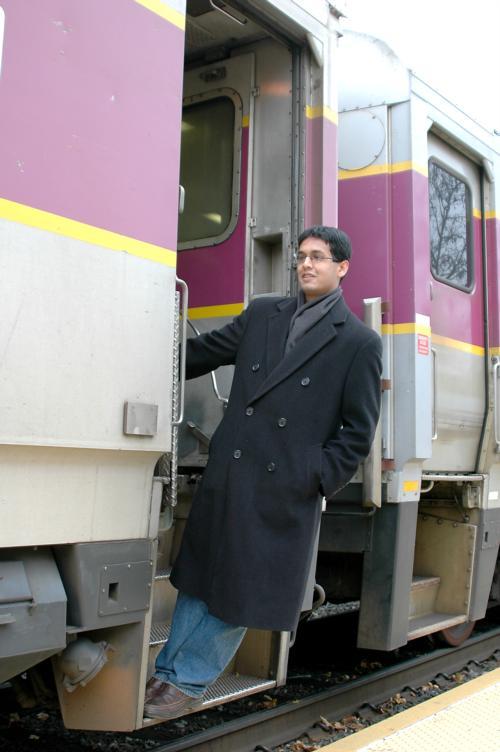
The Cambridge Express
Trains can save the world.
That may sound a bit hyperbolic, but it’s true. Traveling by train—instead of plane or car—reduces carbon emissions, weans the nation from oil, and revitalizes dying communities.
In fact, the benefits are so overwhelming that I insist on taking the train almost anywhere I go—including when leaving Cambridge for home. I live in Chicago.
The environmental and economic benefits of train travel are well documented: the emissions per passenger per mile are about one-tenth of flying, for example, and it was only after the Red Line was extended through Davis Square that that part of Somerville became the hip, up-and-coming neighborhood that it is today.
But while I am a longtime Sierra Club member—and an economics concentrator to boot—these factors aren’t what compel me to make the 21-hour train ride back to Illinois.
I’ll play my cards face up: I’m a devotee of the “Crash” theory on social relations.
As outlined in Don Cheadle’s opening speech, the “Crash” theory argues that disjointed, miserable lives are the result of the isolation of what are inherently social beings, made manifest most clearly by the steel and glass boxes known as cars. Trains are the counterrevolution.
Consider a trip I took home last January.
Around 7 a.m., or about 16 hours into the trip, we were somewhere in northwestern Pennsylvania. I woke up, hungry, and decided to see if I could find some food. I ventured back into the food car where I ordered a bagel, took a seat next to a loud, boisterous group of Norsemen, and promptly told the one nearest me to shut up, if he didn’t mind.
The group, composed of Swedish tourists enjoying one of their generous vacations, was far too consumed by its own good humor to be bothered by a cantankerous 19-year-old who hadn’t been awake so early in months. Instead, they decided I was a worthy project, and offered to teach me to sing some Swedish folk songs.
Now when someone makes you an offer like that, you just can’t turn it down. Before I knew it, I too was singing along with the group—a cheerfully sexist song with a riff similar to “Stand by Your Man.”
By the end of breakfast, around 10 a.m., I went back to my seat for the remaining hour of the trip. I even remember feeling a bit sad when my train pulled into Chicago’s Union Station. The trip had not only been enormously productive—with no Internet to keep me permanently on the grid and more hours than I could hope for to read and sleep—but had also been enormously rejuvenating.
Compare my experience to the awful—and what seems like somewhat typical—voyage my friend Ariadne took to see her sister in Madison, Wis. this past Thanksgiving.
Because her flight was delayed two hours out of Boston, she missed her connector in Minneapolis. (For the record, only a plane would ever pass your destination on the way to taking you there.) This happened to be the last flight to Madison, so she had to wait until the next morning and be re-routed through Chicago. Eventually, she found her way to Milwaukee, where she decided to cut her losses and take a bus.
In the final accounting, she flew over Madison twice and still missed Thanksgiving by six hours—even though she had left Boston on Wednesday.
Now, there’s little that could have been done to cheer up Ariadne after such a trip—little except a group of friendly, folk-song-singing Swedes. But none of her three planes had any. And even if they had, I’m sure their singing would have run afoul of some federal aviation law.
In fairness, I suppose that it’s possible for trains to have screwups too—I’m by no means arguing that they are perfect.
Train tickets aren’t necessarily cheap either, though I usually save about 40 percent compared to airfare.
Worse still, U.S. rail technology is simply pathetic compared to the high-speed rail that exists in virtually every other industrialized country. My train from Boston to Chicago averages about 46 miles per hour--52 miles per hour on the continuous, faster leg from Albany to Chicago. In contrast, the new high-speed Eurostar train ferries commuters from London to Paris at an average speed of 149 mph.
These shortcomings aside, traveling by train, even in the United States, is simply a cut above other forms of transportation.
While planes uncomfortably crowd people against one another, forcing them to retreat into themselves, trains allow for a certain sense of Olympian detachment combined with carefree interaction.
So as my friends sit on the tarmac at Logan or O’Hare on the way home to winter break, I’ll be ensconced comfortably—and, most likely, grinning like a fool—aboard my train. They will likely get to their destinations before I do, but I’ll be more than content to sit at my window, read my Studs Terkel, and watch the countryside roll by.
And I don’t even think I need to meet another group of Swedes—I’d be more than happy with some Norwegians or Danes.
—Staff writer Paras D. Bhayani can be reached at pbhayani@fas.harvard.edu. He is taking the train to Finland in two weeks, and couldn’t be more excited.


